Walking in his grandpa’s footsteps
No one in Justin Butts’ rural hometown expected him to go far – except Justin himself
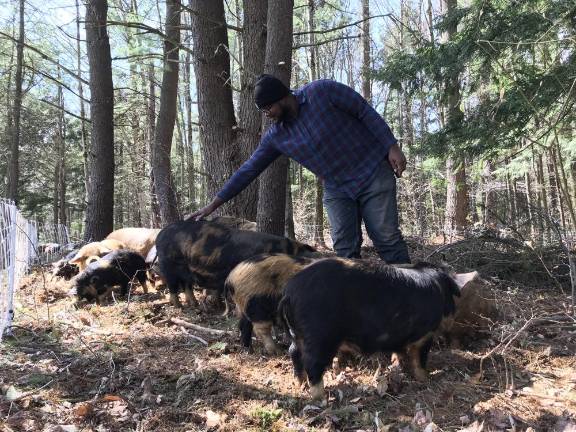
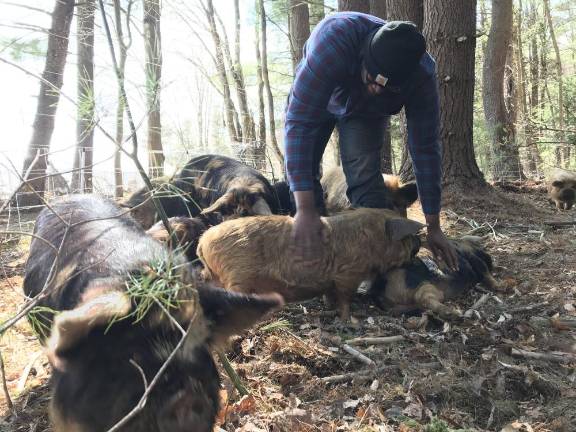
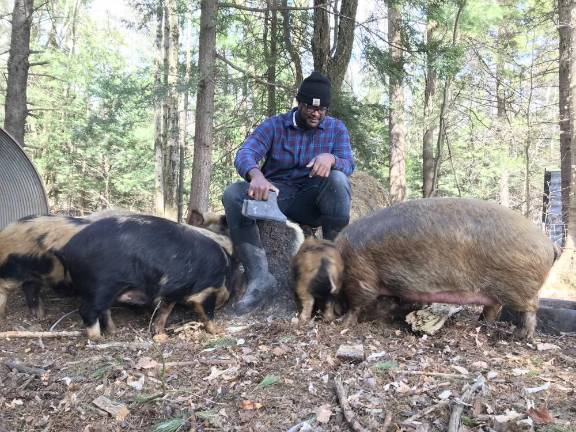
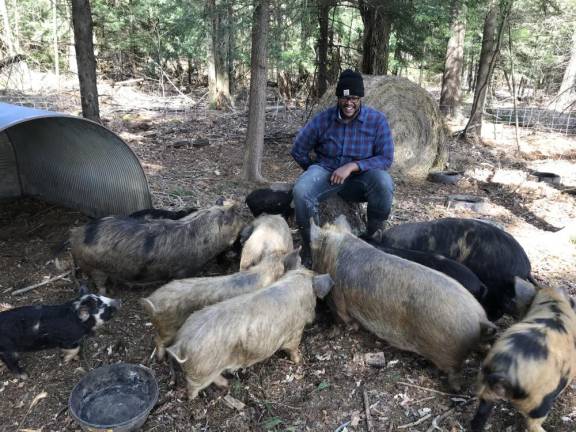
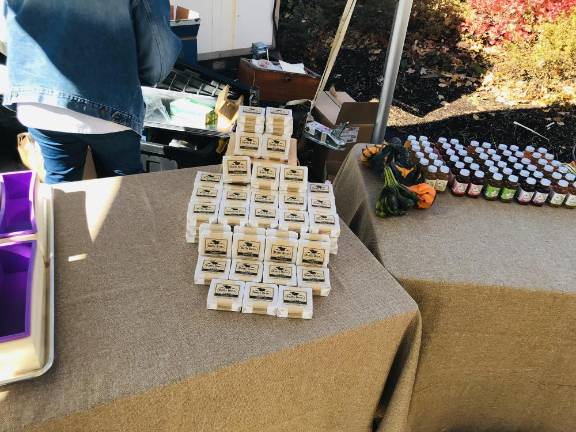
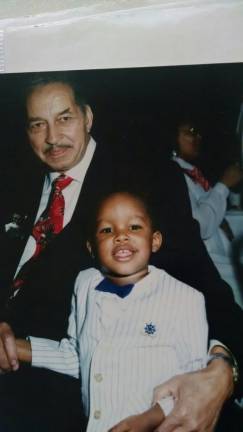
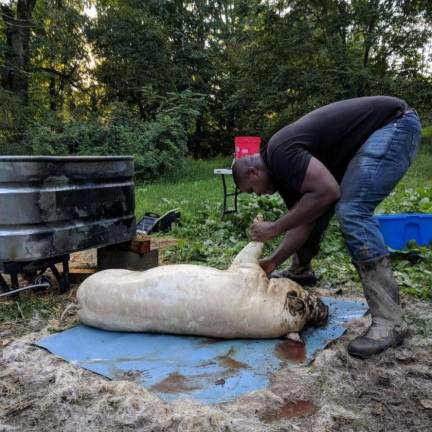

Justin Butts has been hunting down dreams and checking them off like a man possessed. Joining the Navy. Check. Becoming a farmer. Check. Graduating from the Culinary Institute of America. Check. Starting a business. Check. Maybe that’s what happens when you think you’re going to die in your mid-twenties, as Butts did, when he was pulled off his Navy ship off the coast of Phillippines and told by doctors he had stage four leukemia. It turned out to be a mysterious blood disease, which Butts still has to manage, but that scare taught him: “You should do the things you want to do in life now, ‘cause I thought that that was it, I thought I was going to be done.”
You spent four years in the Navy, then a year farming in your hometown in Pennyslvania, and then you fulfilled yet another childhood dream when you got into the Culinary Institute of America.
I had joined the Navy to pay for culinary school because I couldn’t afford to go when I was younger. I got accepted [to the CIA] in 2009 but I knew I couldn’t afford to go, so I decided I would just join the Navy. I knew that I had the GI bill; I would get paid to go to school because I was a veteran. They [CIA] accepted me again in 2016. I had wanted to go to that school since I was like nine years old, so it really meant a lot to me that I had joined the military, I had done all of those things to pay for it, and I actually got to do my bachelor’s degree there.
All through culinary school, you kept four pigs. What’s special about those pigs?
They were Kunekune pigs – they were an endangered species of pig at the time. They were a heritage breed so they didn’t grow very fast, they took a long time to get big. They were also really docile, they’re the most docile breed of pig. And they’re the smallest breed of pig. They only get to be like 350 pounds as adult.
At first I had a friend taking care of them. Halfway through college I had to move the pigs to a farm in New York where I was. I found a farmer and I leased land and I moved pigs to about 25 minutes from school. Every day I’d drive and go take care of them.
When I butchered my first pig I got like two gallons of lard off it. I didn’t know what to do with all this lard because I hadn’t gone to culinary school yet. The lady who sold the pigs to me taught class on soap making, so I went to visit her and I took the class. It was only like a two-hour class, it covered the basics of cold-processing soap making; it wasn’t super in-depth. And I thought it was really interesting and I made some soap and I gave it out to my friends. I spent like a year making soap at home.
I gave it out to my teachers at the culinary school – and I was in business classes at this point. They were really impressed with the soap. They were like, you should put a nice label on this and hand it out. So while I was sitting in marketing class, I’d make up a label, print it out and bring it to my marketing teacher, and I’d get like free advice from these people who were experienced in selling things and had worked in marketing.
Then one of the teachers – who was actually one of chefs, who managed the school cafeteria, The Egg – he said, you know, we have a farmers market, we’d love to sell some of your soap. So he started buying soaps from me. On the weekend I would go and drop off like 150 bars of soap and then he would sell it at his farm stand.
How has Butts Bros. Lard Soap evolved from the early experiments?
Because I was a chef I started working on the soap recipe. I didn’t like cold process soap. So now I actually cook my soap. When I would read books about how people used to make soap, and like how grandmas used to make soap for their families, they would always cook the soap. The cold-process, it has to cure for eight weeks or it can give you a rash, you can get burned – it has lye in it. Lye – which is perfectly safe if you use it properly, but you know, if you put vinegar that’s too strong on, you can burn yourself. Things just have to be used correctly.
But I started doing this hot process soap because you can use it the next day. I think it’s better if you let it sit for a week, but when I’m done making the soap and I’m washing the dishes, all I have to do is pour hot water and I can wash the pots with the soap that’s left over from making the soap. I make a bar, and the next day I take it home and shower with it. Whereas if it was cold processed, I would have a rash if I did that.
And I was always scared when I was selling cold process... did I have it sit long enough? Because people would want it right away. I would make it and I would hold onto it. It was hard to wait that long, when you’re just getting started. With hot process I could make soap on Sunday and wrap it and have it out to you on Friday.
Because I could make it so much faster I could experiment more. I could try different combinations. I started using carrot juice and goats milk. I do an orange-carrot-vanilla soap, cucumber-lime mojito, chocolate coffee stout soap. My favorite is the cinnamon one that I use. I shave with my soap. I have a beard right now, but whenever I shave I usually use my soap.
I get a lot of people telling me that they have a skin problem – or their cousin or nephew or so-and-so breaks out a lot and my soap’s the only one they can use. When I’m making soap it looks like I’m making a cake: there’s no petroleum, there’s no preservatives. Everything I use you can get at the grocery store.
I use mainly the lard from my pigs. I have like 30 pigs right now – I started with four and I bought one more since then, but you know one sow will have 12 pigs in a litter. By making the soap I’m able to pay for keeping all the pigs and have a little extra money to finance more farming.
Farming is a tough job, period. What additional challenges do you face as a Black farmer?
When I was growing up in Pennsylvania there were a lot of white farmers but there weren’t really any Black farmers. And the white farmers – they were young – they were like, ‘Black people don’t farm.’ My grandpa was a farmer. I knew Black people farmed, and I would get so tired of hearing it. When I had my farm there, I was the only Black farmer in the county. Even then – this was 2015 – I didn’t feel supported by the community. But when I moved to New York I felt very supported. I felt like farmers were so excited to see a young person wanting to farm, it didn’t really matter, whereas in Pennsylvania I didn’t get that feeling.
Farmers in New York, anything I needed. You need space to make soap? Here’s space to make soap. Your pigs got out? Let me help you build a new pen. I couldn’t thank them enough. It means a lot to me.
You were on the road to being a chef, but now you’re in your first season as livestock manager at Soul Fire Farm outside Albany. How’d that happen?
I’d already been offered a job at the school, to be an assistant chef at one of the restaurant classes at the Culinary Institute, and I was really looking forward to that. But then they offered me this job here, to be the livestock manager – to work on a farm, taking care of animals, and that’s kind of like my dream job. It’s what I always wanted for myself and what I spent my free time doing. So I said, I would much rather get paid to do my favorite hobby [laughs]. I love cooking, it’s definitely a passion of mine, and I’m a certified professional chef, but farming just means so much to me. I find it gives me so much independence, and just wisdom about, like, life.
And now especially with the pandemic, most of my classmates that I talk to are out of work. I can’t think of a single one that’s working regularly right now, because we’re all chefs or waiters, we’re all in the hospitality business. But I’m here on the farm taking care of animals every day, and very proud to be.
Has your soap business seen a bump since the pandemic?
Once the pandemic started, I had just given out a few bars to neighbors after I’d moved up here. Just from that, one of the farms down the street started buying from me, they bought 100 bars so far. 20 bars is $100 bucks, so I’m pretty pleased with that. Another neighbor, I’d just given a bar. He liked it, he’s been giving it out to his friends and family, he buys 20 bars at a time. It seems like there’s definitely a very strong interest in having a natural handmade soap. Now I’m seeing commercials for handmade bar soap on the internet, and I’m like, Oh that looks a lot like the soap I make. But I think anyone making soap is a wonderful thing.
I try to teach people. When I sell the pig, I tell people, if you take the fat from the pig you’re buying – which you’re probably going to throw out – you could make enough soap to last your family a year.
How do you know so much about how grandmas used to make soap?
I have a bunch of books about soap making. One of my favorite books is The Encyclopedia of Country Living, which is a book I got when I was 17 years old. Then I talk to family members that are older, typically over 50. They’re like oh yeah my grandma used to make soap, or this or that.
If you were butchering a pig, soap was just a natural byproduct. If you were going to raise a pig, why would you buy soap when you have all that lard? I’d say up until the 20s, if you weren’t in the city you were probably making your own soap. Because you can make lye out of ashes. I buy food grade lye because I think it would make people more comfortable – it’s been inspected and it’s safe. But I could burn some oak wood and collect the ashes and use that to make the lye to make soap and not have to buy anything. Just use lard from pigs, water from the pond here, and ashes from an oak tree, and I could make soap without having to buy anything from anyone.
That would be a very rough soap. I don’t think I’d really enjoy taking a shower with that. I’d probably feel too clean after that. Some soap makes you feel too clean, so I started adding like cocoa butter and shea butter to my soaps to make your skin softer.
You have a strong connection to an earlier time. I wonder if that’s because of your grandparents?
I would say I was raised by my grandparents. When I was a child, every morning around 6 I was dropped off at my grandparents’ house. And I would get picked up around 6 again, I had already eaten dinner and I was supposed to have done my homework. I’d spend most of my day with my grandma and grandpa, in the garden or just helping them do anything. My grandpa was born in 1923, so they were children of the depression, and they were different. So I kind of always was different growing up than a lot of my friends. They were like, why are you acting like that? I was always nicer, more respectful.
Tell us about your grandfather.
When I was a child he had three houses and he had a garden at each one, and he used to give out food to his neighbors, that was a big thing. I never understood it when I was little: why he had so many gardens. One house he’d rent out, another house he let a friend live there, but he would grow tomatoes, he would have his brother send him up seeds in North Carolina. Some of his family still farmed, they would save seeds.
My brother and my dad always had basketball but me and Grandpa always had the farm. I remember eating tomato sandwiches and things like that. I always looked forward to going out with pitchforks with grandpa, and like turning over the soil, putting the tomatoes in or picking string beans... things that now I’m like oh that’s rough on the back, when I was a little kid I loved it, and I’m so thankful they spent the time to do those things with me.
I always wanted to play sports, they never seemed to let me. I didn’t get to play football ‘til I was in high school. They were kind of sheltered over me, and I think it was because it was a more urban area when I was little, and I’m African American, I think they were just worried from my safety.
Once we moved to Pennsylvania, there were no sidewalks, so farming was kind of my refuge ‘til I got into high school and started playing sports.
Where were you born?
I was born in Englewood, NJ. I didn’t move to Pennsylvania ‘til I was 10. And my grandpa died when I was 10 so I guess that was when I started growing stuff on my own and figuring it out. I had always kind of idolized my grandpa. He was a farmer; growing food with him was some of the best experiences I had when I was little.
And he was a World War II veteran?
That was why I wanted to go into the military... he told me he was a cook in World War II. He went to France and Germany and England. I wish I had been older so I could remember the stories better. I know he had gangrene in one of his feet but he didn’t lose it.
I guess I had a fondness for the military because of him. And then when I was younger in Pennsylvania... I knew I was smart, but it didn’t seem like the people in the area were very supportive. I don’t want to call it racial bias, it was just like I wasn’t expected to go very far. I would say in my hometown, a lot of the people just did not have very high ambitions. I just knew I didn’t want to be there. I didn’t want to live within that same area forever. There were people there that had never gone outside of 30 miles of the place they were born, and that to me just sounded awful. I knew I wanted to travel, and I knew I wanted to leave Pennsylvania, and I knew I couldn’t afford the college I had just been accepted to. So I lost 100 pounds and I joined the Navy.
You just dropped it casually, but you lost 100 pounds?
Yeah I’m like 6’7” so I’ve always been kind of big. I wrestled in high school so I was used to losing weight. I had become a cook after high school. I went to work at a resort, and I had gotten kind of big, I got up to like 340 pounds. The Navy would not let me join. They said I had to weigh under 220 to get in or I had to pass a measurement test. The only time I ever got under 220 was when I went to boot camp and I had pneumonia [laughs].
You must have been seriously motivated.
My parents had stopped me from joining the military before; I tried to join out of high school. I was just so frustrated because my parents, they didn’t have any money to help me go to college, they didn’t have any plan for me, but they’re telling me not to do something with my life that I felt would make it better. I think that at that point we had lost our house already, we didn’t even have hot water in the apartment we were living in, so I just wanted to get out of there.
The military just completely changed that. All of a sudden I had new clothes, I had uniforms to wear, I had guidance. When I was in the military I saw so many Black people that were leaders, they were master chiefs and chiefs and officers. I guess I just had never been exposed to that growing up in rural Pennsylvania where most of the time I was the only Black student in class.
You mentioned that you didn’t understand why your grandfather was always giving out food. Do you get him better as you get older?
I remember hearing stories about his family growing up during the Depression. I remember one story in particular: They would pretend that their farm wasn’t theirs so that people wouldn’t attack it or burn it down. They would pretend they were the Black people who sharecropped or worked there. And during the Depression apparently people used to wander around to their neighbors, looking for food. I don’t know if that had something to do with that. Basically if you were a friend of his he wasn’t going to let you go hungry. He was a different kind of person, he’d pick up hitchhikers. I remember being in the car, just picking up somebody, give ‘em a ride. He’d have friends who were moving, we’d go over to their house and help ‘em. He was in his 70s. Maybe it’s because he had a grandson who was nine and like six feet tall and 150 pounds already that liked to just do things, maybe that was why. He was always trying to help people and just be active.
Tell me about animals you keep at Soul Fire Farm.
I’m the livestock manager here so I have a flock of sheep coming, we’ll have like 15 sheep here. I keep a flock of 60 egg-laying chickens, then we do meat birds, 250 meat birds a year, and that’s always going up every year. This year I added in geese and 20 guinea hens.
I hope you have room to spread out and not have to listen to them.
Well we have 80 acres. But the plan is if the guinea hens get frustrated we’ll eat them. That’s always my rule. If you have an animal – any animal – that’s causing you grief or making you unhappy, do not keep that one. I think a lot of people have one animal that’s a problem and that ruins their whole farming experience.So I had a pig named Hank that would like destroy a new pen, got his sister pregnant, would break out of everything. He trained himself to get used to electric fencing. He was smart, he’d know when I turned it off. He was the only pig that would actively watch me the whole time, watch me in such a way that I think he knew what I was doing.
He’d escape at just the wrong moment – just the worst. Once I ate Hank having animals became a lot more fun. I’ve kinda kept that rule since – whatever one is escaping a few times or doing something I don’t like, get rid of that one so they don’t teach the others to do it, and you know, you kind of feel better: that pig you chased for two hours, when you sit down to eat some ribs, you remember that pig you chased when it was 90 degrees out.
Get rid of the one that’s upsetting you. Eat that one, don’t let it ruin it for everyone else. The other animals are probably fine. All the pigs now are fine. If I had Hank right now, he would have set everybody free.
The danger to Black lives from police brutality is front of mind right now, but diet-related illness is an even bigger killer of Black people. Can you talk about the place of food in communities that may not even have a grocery store?
In a lot of these communities, the people are so far removed from these foods that they don’t necessarily have the equipment. If you give people a butternut squash, you want them to have these foods but if they don’t know how to cook it... you need a chef’s knife to cut up a butternut squash. When I was a kid, my mom had knives, but she used a steak knife to cut everything, or a paring knife. A lot of people, not only do they not have access to food but they’re so far removed from it they don’t have the equipment necessary to prepare it, and the skills, it’s a lot of issues. I think it’s educating people and making access to good food available, which is what we’re doing here. We do solidarity shares. In a few weeks I will actually start delivering to families in the Albany/Troy area: eggs from the chickens, vegetables from the garden, in the future we’ll start adding meat as well. On the farm, people do podcasts where they’re talking about the ingredients and answering people’s questions. I think it’s not just giving people the food, it’s kind of being a resource.